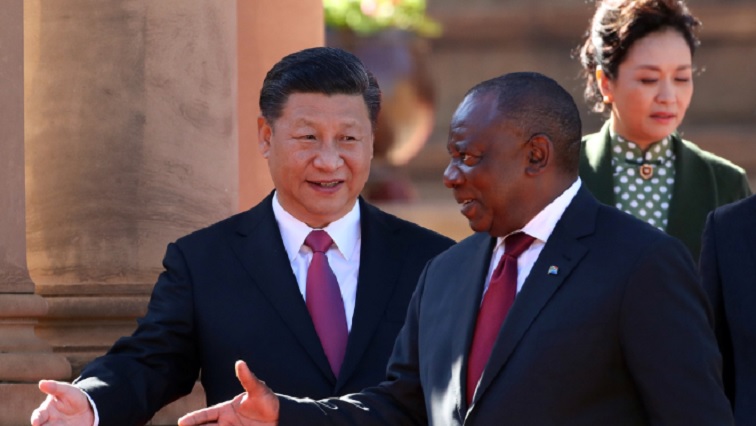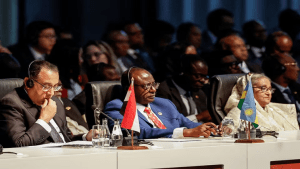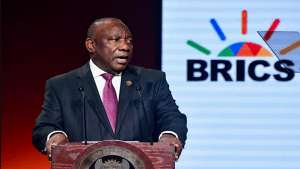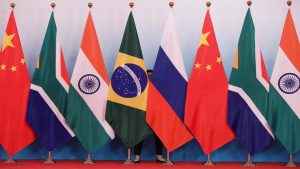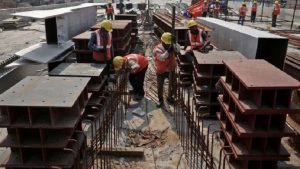Chinese President Xi Jinping is expected to paint the South African capital city, Pretoria, as red as the flag of China when he “kills two birds with one stone”, attending the BRICS heads of state summit and also using the time as an official state visit.
He is scheduled to arrive on Tuesday August 22, the day the BRICS Summit kicks off in earnest until it ends two days later, on August 24 in Sandton, Johannesburg.
President Xi’s visit is much anticipated not only by the BRICS Summit and the SA government, but also by the entire African continent that forms part of the BRICS-plus bloc.
The Chinese leader is expected to be quite a busy bee whilst in SA. More than forty heads of state are expected to attend to attend the summit and a series of bilateral meetings are expected to be held on the side-lines of the summit with the leader of the world’s biggest developing economy.
It will be President Xi’s first visit to Africa since 2018, the lull before the storm in the form of the advent of the global pandemic, COVID-19.
SA and China enjoy the warmest bilateral relations since the diplomatic ties were established between the two nations 25 years ago. The Chinese leader’s state visit this week will be his fourth to Pretoria. His first state visit was in 2013, then two years later in 2015 and then the last was in 2018.
Through it all, the diplomatic ties between the two BRICS members have continued to grow stronger. Trade between the two nations has multiplied double-digits fold, sport, arts and cultural exchanges have sky-rocketed, energy, technology, cyber-security and people-to-people diplomacy continues to characterise the harmonious relations between the two friendly nations.
There are more than 350 000 Chinese people living in SA. They serve as a bridge for myriad of interests that enhances close ties between the two nations. China and SA’s cooperation at BRICS and in other multilateral forums such as the UN are frequently noticeable. Their mutually-beneficial geopolitical relationship translates into support for each other’s national interests. The two nations have flatly refused to succumb to intense western pressure to side with NATO in the Russia-Ukraine conflict, maintaining a non-aligned stance whilst respectively keeping their close ties with Moscow.
Significantly, China is SA’s largest trading partner, receiving 9.4% of SA’s exports and a source of over 20% of SA’s overall imports in 2022 alone. In the same year, trade between China and SA reached 56 billion US dollars. The figure is almost three times more than trade between SA and the USA, which for same period (2022) stood only at 21 billion US dollars.
The embassy of China in SA in fact describes trade between Pretoria and Beijing as follows: “Economic and trade cooperation benefits both sides. China has been SA’s largest trading partner for 14 years in a row, and SA has been China’s largest trading partner in Africa for 13 years straight.”
President Xi’s visit to SA in the coming days has been preceded by China-led activities as part of the build-up towards the BRICS heads of state summit. This week, Xinhua news agency (the oldest media house founded by Chairman Mao) and the Communist Party of China (CPC) led the launch of the BRICS TV channel in Sandton. The channel is the outcome of collaboration between the media establishments across all the BRICS member-states. The multi-national news network is expected to serve as a flagship in the narrative of BRICS messaging and communication of the bloc’s resolutions and events from their standpoint.
Brazil, Russia, India, China and SA authorities have endorsed a pact to collaborate in the news gathering, content development and news dissemination from a single platform in the form of BRICS TV. At the ceremony, the ANC was represented by its 1st deputy Secretary-General Nomvula Mokonyane, who hailed the television launch as marking an epoch moment in the rapidly changing western-led unipolar world order.
Addressing the launch ceremony, Ms Mokonyane said: “The world is changing at a faster pace than before, to adapt, we need to build a new paradigm of a shared value system.”
BRICS cooperation in the media was also marked by a three-day 6th BRICS Media Forum in Houghton, Johannesburg. It reviewed in detail ways and means of countering the domineering western news platforms through cultivating more of the south-south cooperation. China’s string of media networks participated through research presentations and speeches by industry captains. The winds of change could be felt throughout the three days of multilateral collaborator activities. Change is coming!
The pomp and ceremony that awaits President Xi’s arrival at the Union Buildings – seat of government – will bear testimony to China’s growing influence and impact in global affairs. Dozens of bilateral meetings with the visiting heads of state who all are keen to cement ties with China as the world look to the east are also a barometer of China’s stature in a global force.
The embassy of China SA held a media briefing at the HQ in Arcadia on Friday to outline several things about the imminent arrival of President Xi and the 15th BRICS summit that takes place within days.
China’s top envoy, Ambassador Chen Xiaodong, told a packed news conference that President Xi will work with his BRICS counterparts “to explore projects that meet the development needs of the five countries and the common interests of their people”.
Amb Chen explained: “BRICS leaders will exchange ideas on proposals regarding further cooperation in energy, economy and trade, agriculture, and other fields. They will explore building BRICS cooperation mechanisms for young people and persons with disabilities, so as to take BRICS cooperation to a higher level.”
Amb Chen also said: “The Chinese side is confident that President Xi’s reunion with the BRICS leaders in South Africa will produce important results and inject new energy into BRICS cooperation.”
He further hinted at the much-anticipated heads of state discussion and possible resolution on the possible expansion of BRICS membership. Said Amb Chen: “BRICS expansion has become the top trending issue at the moment. Expansion is key to enhancing BRICS mechanism’s vitality. I believe that this year’s Summit will witness new and solid steps on this front.”
So far 23 countries have formally applied to join the BRICS bloc. They include Saudi Arabia, Argentina, Iran, Indonesia, Turkey, Venezuela, Egypt and Kenya, among others.
Amb Chen was eagerly looking forward to President Xi’s state visit as well, describing it as a moment of great significance. He said: “On the political front, the two countries have strong mutual respect and trust. We firmly support each other on issues of our respective core interests and major concerns. We closely communicate and coordinate with each other in international affairs.”
President Xi and his host, President Cyril Ramaphosa, are expected to hold a joint press briefing. The two heads of state will also sign important bilateral cooperation documents. Dozens of cabinet ministers from both sides will also form part of the strategic engagements.
During the Covid-19 people-to-people restrictions, Presidents Xi and Ramaphosa exchanged a flurry of letters and spoke on the telephone countless times.
*Abbey Makoe is a Pretoria-based independent freelance Diplomatic Writer. The views expressed are his own.


